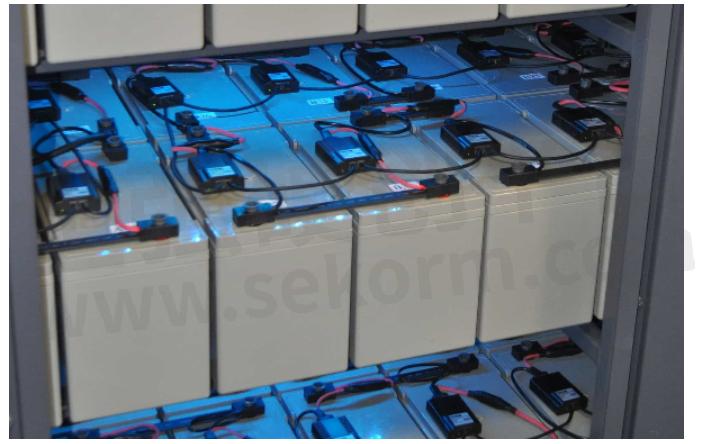What Is a UPS Battery?




Uninterruptible Power Supply (UPS) systems have become an integral part of our modern lives, ensuring a continuous and stable power supply for critical devices and systems. At the heart of these devices lies a crucial component - the UPS Battery. What is a UPS battery? In this article, we will explore the ups and downs of UPS batteries, focusing on their fundamental role, differences from regular batteries, lifespan, purpose, types, and the best options available.
What is a UPS?
A UPS, or Uninterruptible Power Supply, is an electrical device that provides emergency power to connected equipment when the main power source fails or experiences voltage fluctuations beyond acceptable levels. The UPS is designed to provide a temporary power bridge, ensuring continuity of power to critical systems and preventing data loss or damage to electronic devices during unexpected power interruptions. UPS systems are widely used in homes, businesses, data centers, healthcare facilities, and other critical environments where a stable and uninterrupted power supply is essential for the proper functioning of electronic devices and systems. Key components of a UPS system include:
◆Inverter: The inverter is a crucial component that converts DC (direct current) power from the UPS battery into AC (alternating current) power, which is used by most electronic devices.
◆Battery: The battery is the energy storage component of the UPS. It stores electrical energy and releases it when the main power source is disrupted. UPS batteries are rechargeable and typically made of lead-acid or lithium-ion technology.
◆Charger: The charger replenishes the UPS battery by converting AC power from the main source into DC power for storage in the battery. This ensures that the UPS is always ready to supply power during an outage.
◆Transfer Switch: The transfer switch is responsible for monitoring the quality of the incoming power. If it detects a power failure or abnormal voltage, it swiftly transfers the power source from the main electricity grid to the UPS battery, ensuring an uninterrupted power supply.

Fig.1
What is a UPS battery?
A UPS battery is a rechargeable energy storage device that forms a critical component of a UPS system. The primary purpose of a UPS battery is to provide a temporary power source during electrical outages or disruptions. This is crucial for protecting sensitive electronic equipment, such as computers, servers, and networking devices, from potential damage or data loss. When the main power supply fails or experiences voltage irregularities, the battery for UPS kicks in to supply power, preventing downtime and ensuring the uninterrupted operation of connected electronic devices.

Fig.2
Difference between UPS and normal battery: Is UPS a battery?
While UPS is not merely a battery, the battery is a central and critical component of the UPS system. The primary distinction between a UPS battery and a regular battery lies in its purpose and functionality. A regular battery stores electrical energy and releases it when needed. In contrast, a UPS battery serves as a backup power source to maintain uninterrupted power during electrical interruptions. Battery UPS batteries are designed to deliver a steady flow of power for a specific duration, allowing critical systems to operate seamlessly until the main power source is restored.
Types of batteries used for UPS
Various types of batteries are used in UPS systems, each with its advantages and disadvantages. Common types include:
◆Lead-Acid Batteries: Traditional and cost-effective, lead-acid batteries are commonly used in UPS systems. They come in two main variants: valve-regulated lead-acid batteries(VRLA batteries) and flooded lead-acid batteries.
◆Lithium-Ion Batteries: Known for their high energy density and longer lifespan, lithium-ion batteries are becoming increasingly popular in UPS applications. They are lighter, more compact, and require less maintenance compared to lead-acid batteries.
How long do UPS batteries last?
The lifespan of a UPS battery can vary based on factors like usage, environmental conditions, and battery type. Typically, Lead-Acid UPS batteries have a lifespan of around three to five years. It's advisable to consider replacement once the battery reaches this age, even if it appears to be functioning normally. Lithium-ion UPS batteries often have a longer lifespan, ranging from five to ten years. However, they may still need replacement if their performance declines. Generally, when operating under ambient conditions (68° to 77° F), most UPS batteries have an expected lifespan of three to five years. However, batteries can fail much faster in conditions outside the recommended parameters for a UPS system.
Lead-Acid UPS batteries vs lithium UPS battery: the future of UPS batteries
The choice between a lead-acid UPS battery and a UPS lithium battery involves considerations of factors such as performance, lifespan, cost, and environmental impact. The future of UPS batteries is likely to involve a continued shift toward lithium UPS battery for many applications. As advancements in lithium-ion battery safety, energy density, and cost-effectiveness continue, they are becoming increasingly popular in UPS systems. The demand for compact, lightweight, and longer-lasting power solutions, especially in data centers, telecommunications, and other critical infrastructure, is driving this transition. However, lead-acid batteries will likely remain relevant in specific applications where cost is a primary concern, and the advantages of lithium-ion ups battery are not critical. Ultimately, the choice between lead-acid and lithium-ion UPS batteries will depend on the specific needs, priorities, and budget constraints of the user or organization.
Conclusion
In the world of uninterrupted power supply, the UPS battery stands as a silent guardian, ready to spring into action when the lights go out. What is a UPS battery? Understanding the nuances of UPS batteries, their types, and their importance in maintaining a seamless power supply is crucial for anyone relying on electronic systems for their work or daily activities. Whether it's a lead-acid or lithium-ion UPS battery, the right UPS battery can be the key to keeping your devices powered and your data safe during unexpected outages. As a global leader in lithium battery cell manufacturing, Grepow offers professional customization solutions for UPS battery packs and Battery Management Systems (BMS), catering to your specific application requirements.
- |
- +1 赞 0
- 收藏
- 评论 0
本文由三年不鸣转载自Grepow News,原文标题为:What Is a UPS Battery?,本站所有转载文章系出于传递更多信息之目的,且明确注明来源,不希望被转载的媒体或个人可与我们联系,我们将立即进行删除处理。
相关研发服务和供应服务
相关推荐
How to Solve the Imbalance between Li-ion Battery Pack Cells and the usual maintenance of Lithium-ion batteries
Grepow tells how to Solve the Imbalance between Li-ion Battery Pack Cells and the usual maintenance of Lithium-ion batteries? and then Grepow shares with you some of the usual maintenance of lithium-ion batteries
LFP vs NMC Battery: Exploring the Differences
In the realm of energy storage, Lithium Iron Phosphate (LFP) and Nickel Manganese Cobalt (NMC) batteries have emerged as two prominent contenders. Both have unique characteristics and applications, making them popular choices for various industries. LFP vs NMC Battery: What‘s the difference? This article aims to delve into the specifics of LFP and NMC batteries, outlining their features, benefits, and drawbacks.
Are All UPS Systems the Same?
UPS (Uninterruptible Power Supply) systems play a vital role in safeguarding electronic equipment from power disruptions, ensuring continuous operation and protecting against data loss. However, not all UPS systems are created equal. The choice of a UPS system depends on specific factors, including the application requirements, the criticality of the load, and the environmental conditions. In this article, we explore three common types of UPS systems, their applications, and essential considerations for choosing the right UPS for your needs.
Uninterrupted Safety: Understanding Lithium-ion Batteries in UPS Technology
In the industrial uninterruptible power supplies (UPSs) market, the demand for lithium-ion batteries has been steadily rising due to their compact size, high energy density, and eco-friendliness compared to traditional lead-acid batteries. In response to this demand, SANYO DENKI has developed a cutting-edge Lithium-Ion battery pack designed to deliver exceptional performance, safety, and longevity for our Lithium-Ion battery-operated UPS series.
SANYO DENKI‘s UPS with Automatic Battery Self Test to Ensure Reliable Power
SANUPS UPS systems from SANYO DENKI are designed with robust battery management features to ensure your equipment remains operational during power outages. One standout feature is the automatic battery self test.
CP DC UPS 24V Operating instructions
型号- CP DC UPS 24V 20A/10A,CP A BATTERY 24V DC 7.2 AH,CP A BATTERY 24V DC 1.3 AH,CP A BATTERY 24V DC 17 AH,1406930000,1370040010,1251070000,CP A BATTERY 24V DC 12 AH,CP A BATTERY 24V DC 3.4 AH,CP DC UPS 24V 40A,1251080000,CP DC UPS 24V,PROMAX SERIES,1251090000,1370050010,PROMAX,1251110000
Reliable Power Backup for Your Factory: E11B UPS from SANYO DENKI
With its reliable performance, extended battery lifespan, wide operating temperature range, and energy-efficient operation, the E11B UPS is the perfect choice to ensure an uninterrupted power supply for your factory, minimizing downtime and maximizing productivity.
What Is UPS in PLC?
Programmable Logic Controllers (PLCs) play a crucial role in industrial automation, managing and controlling manufacturing processes with precision. To ensure the uninterrupted operation of PLCs, especially in critical applications, it is essential to consider a reliable power backup solution. Uninterruptible Power Supplies (UPS) come into play as a safeguard against power disruptions that could compromise the functionality and reliability of PLCs.
Shorter-Than-Expected UPS Battery Life Increases Maintenance Burden
SANYO DENKI proposed a hybrid UPS called SANUPS E11B. This UPS switches between Economy Mode and Quality Priority Mode depending on the input power voltage. This energy-efficient technology prevents the battery from being worn out.
SANYO DENKI Develops SANUPS E11B-Li Hybrid UPS Can Operate for 10 Years without Battery Replacement
SANYO DENKI has developed and released the SANUPS E11B-Li Hybrid UPS with lithium-ion batteries. By integrating the trusted E11B‘s hybrid UPS topology with the advantages of lithium-ion batteries, the SANUPS E11B-Li offers exceptional energy efficiency, reliability, and performance.
SANUPS A11K-Li Lithium-ion Battery UPS
型号- P10913,PMS53□00DL,S-A11KL152B0400TSN00RM,S-A11KL102C0013UJ,S-A11KL502B0060TST00□□,P10911,P10912,S-A11KL152B0□00TSN00□□,S-A11KL302B0□□0TS□00□□,S-A11KL502B0030TST00,S-A11KL302B0150TS□00□□,S-A11KL302B0019SSN00,S-A11KL302B0200TST00RM,S-A11KL152B0300TSN00□□,S-A11KL302B0019SST00,S-A11KL102B0013SSN00,S-A11KL302B0300TS□00,PRCONIF006-US,PRLANIF031,S-A11KL302B0100TSN00RM,S-A11KL202B0015SS□00,S-A11KL152B0019SSN00,S-A11KL152B0400TSN00□□,S-A11KL302B0200TSN00RM,S-A11KL502B0090TST00,S-A11KL502B0060TST00RM,PMS52□00DL,S-A11KL302B0200TSN00,S-A11KL302B0200TST00,S-A11KL302B0150TSN00,S-A11KL502B0060TST00,PRCONIF005-US,S-A11KL302B0100TST00RM,S-A11KL302B0150TSN00RM,S-A11KL502B0180TST00,S-A11KL502B0011SST00,S-A11KL152B0600TSN00,S-A11KL302B0100TS□00□□,S-A11KL152B0500TSN00,S-A11KL152B0200TSN00□□,S-A11KL302B0050TS□00,S-A11KL152B0400TSN00,S-A11KL302B0009SS□00,S-A11KL302B0050TST00,S-A11KL302B0009SST00,S-A11KL302B0250TS□00,S-A11KL302B0009SSN00,S-A11KL152B0008SSN00,S-A11KL502B0150TST00,S-A11KL152B0100TSN00,S-A11KL302B0250TST00,S-A11KL302B0150TST00,S-A11KL152B0300TSN00,S-A11KL152B0300TSN00RM,S-A11KL152B0200TSN00,S-A11KL502B0090TST00□□,S-A11KL502B0□□0TST00□□,S-A11KL502B0120TST00,S-A11KL152C0008UJ,S-A11KL302B0300TSN00,S-A11KL502B0120TST00□□,A11K-LI,S-A11KL302B0150TST00RM,S-A11KL302B0100TSN00,S-A11KL302B0019SS□00,S-A11KL302B0250TSN00,S-A11KL302B0300TST00,S-A11KL302B0100TST00,S-A11KL302B0050TSN00,S-A11KL502B0090TST00RM,S-A11KL202B0015SST00,S-A11KL302B0200TS□00□□,RSW016,S-A11KL202B0015SSN00,S-A11KL152B0200TSN00RM,RSW015,S-A11KL502B0120TST00RM
What Is a Lithium-Polymer Battery Cell?
In this article, we‘ll explore what lithium-polymer battery cells are, how they differ from other lithium-based batteries, their advantages and disadvantages, and their common uses.
SANYO DENKI Develops Parallel Redundant UPS SANUPS A11N-Li with Long-Life Lithium-Ion Battery SANUPS POWER SYSTEMS Product News
型号- A11NL502,A11N-LI,A11NL153,A11NL103,A11NL203
A Comprehensive Guide to Lithium Ion UPS: Unveiling the Power Behind Backup Systems
Uninterruptible Power Supplies (UPS) play a crucial role in safeguarding electronic devices and critical systems from power disruptions. Traditionally, lead-acid batteries have been the go-to choice for UPS systems, but recent advancements in battery technology have introduced lithium-ion batteries as a viable alternative. In this comprehensive guide, we delve into various aspects of Lithium Ion UPS, addressing common questions and considerations.
5 Advantages of Lithium-Ion Battery Operated UPS SANUPS E11B-Li
As we introduce the new Hybrid UPS, SANUPS E11B-Li with lithium-ion batteries, a key question emerges: What makes lithium-ion battery UPS systems superior to Lead-Acid Battery UPS? This article aims to answer that question. The use of lithium-ion offers five distinct advantages: a long lifespan, compact and lightweight structure, no performance deterioration over time, eco-friendly design, and in-house manufactured battery.
电子商城
品牌:至诚微
品类:Highly integrated synchronous boost charger IC
价格:¥1.9200
现货: 10,000
品牌:至诚微
品类:Highly integrated synchronous boost charger IC
价格:¥1.2941
现货: 10,000
服务
提供稳态、瞬态、热传导、对流散热、热辐射、热接触、和液冷等热仿真分析,通过FloTHERM软件帮助工程师在产品设计初期创建虚拟模型,对多种系统设计方案进行评估,识别潜在散热风险。
实验室地址: 深圳 提交需求>
使用FloTHERM和Smart CFD软件,提供前期热仿真模拟、结构设计调整建议、中期样品测试和后期生产供应的一站式服务,热仿真技术团队专业指导。
实验室地址: 深圳 提交需求>







































































































































































































登录 | 立即注册
提交评论